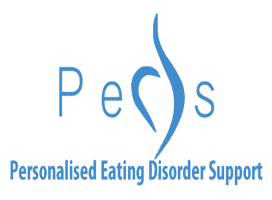Blue Dolphin is proud to have as its charity of choice PEDS (Personalised Eating Disorder Support)
PEDS became a registered charity in April 2014, seeing service users of all ages who have a primary diagnosis of an eating disorder.
Throughout there work in eating disorders, it became apparent that there is little support available before and after hospital and if caught early enough, an admission may not be needed. Their joint experience as mental health and paediatric nurses helps them to reach out to all members of the community. There main focus is to help a person and their family gain an understanding of their illness and develop coping skills to manage their symptoms.
The charity is run by two nurses who between us have over 30 years experience working in the field of eating disorders. This includes working on a paediatric ward, CAMHS case management, adult eating disorders and working within a specialist eating disorder in-patient unit.
They are based at Boroughbury Medical Centre in Peterborough City Centre where they offer assessments. They also have a telephone support line during the week and respond to emails (this is a free service), as well as offering outreach and individual / family sessions to people in their homes. Training can be provided to schools, GPs and clubs / other voluntary sector organisations at a small fee.
Whilst they acknowledge it can seem a long road to recovery, the purpose of the charity is to ensure you are not alone on your journey and have support.
The Purpose of PEDS
- To raise awareness of eating disorders
- Provide a better understanding of the illness amongst sufferers, their families/carers and professionals including the general public
- To provide help and support to sufferers on their journey towards recovery
PEDS Vision
- To reduce the mortality rate of eating disorders
- For sufferers to manage their symptoms to be able to live in a world where they have a good quality of life
- For sufferers to be able to access help when they need it
- All educational sectors and employers to have knowledge and understanding of eating disorders
PEDS Mission
To provide nurse led, personalised eating disorder support with the aim being to help the sufferer to manage their eating disorder and to build a life to get well for which is not controlled by their illness. This includes equipping carers and families with the tools to be able to support their loved ones.
Whilst we understand the importance of Hope, we also acknowledge the realities of what we are up against when it comes to fighting eating disorders. In sharing our determination, passion and skills, we will help strengthen our sufferers, their loved ones and professionals we work alongside, in winning the battle against eating disorders.
What are eating disorders?
Eating disorders can affect those of any age, gender or nationality. An eating disorder can be recognised as an illness which has a negative effect on a person’s quality of life.
There are many types of eating disorders with the main ones listed below:
Anorexia nervosa
Anorexia nervosa is a serious eating disorder characterised by a distorted body image, an intense fear of gaining weight, and an obsessive desire to lose weight. People with anorexia nervosa often have a distorted view of their body shape and size, and they may see themselves as overweight even when they are severely underweight.
Individuals with anorexia nervosa often engage in restrictive eating behaviours, such as severely limiting their food intake or avoiding certain types of food altogether. They may also engage in excessive exercise, purge, or use other methods to rid their body of calories.
Anorexia nervosa can lead to severe physical and mental health problems, including malnutrition, electrolyte imbalances, heart problems, digestive issues, and depression. Without treatment, anorexia nervosa can be life-threatening.
Bulimia Nervosa
Bulimia nervosa is an eating disorder characterised by recurrent episodes of binge eating followed by purging behaviours, such as self-induced vomiting, using laxatives or diuretics, or excessive exercise.
People with bulimia nervosa often have a distorted body image and an intense fear of gaining weight. The binge-eating episodes are typically characterized by eating large amounts of food in a short period of time, feeling out of control during the episode, and experiencing intense guilt and shame afterwards. Purging behaviours are used as a way to compensate for the binge-eating episodes and to prevent weight gain.
Bulimia nervosa can lead to serious physical and mental health problems, including electrolyte imbalances, digestive problems, dental issues, and depression. Without treatment, bulimia nervosa can be life-threatening.
It’s important to note that bulimia nervosa can occur in individuals of any gender, age, race, or socioeconomic status, and seeking treatment from a mental health professional is the best way to manage and recover from this disorder.
Binge Eating Disorder
Binge Eating Disorder (BED) is a type of eating disorder characterised by recurrent episodes of binge eating, in which a person consumes a large amount of food in a short period of time, often feeling out of control during the episode. Unlike bulimia nervosa, individuals with BED do not engage in purging behaviors such as self-induced vomiting or excessive exercise to compensate for the binge-eating episodes.
People with BED often have a feeling of shame and guilt after the binge episode and may experience negative emotions such as depression or anxiety. They may also have a distorted body image and an intense fear of gaining weight.
Binge Eating Disorder can lead to physical and mental health problems such as obesity, type 2 diabetes, high blood pressure, and depression. It’s important to note that BED can occur in individuals of any gender, age, race, or socioeconomic status.
Treatment for Binge Eating Disorder usually involves a combination of psychotherapy, such as cognitive-behavioural therapy or interpersonal therapy, and medication, if necessary. A mental health professional can help individuals with BED to develop healthier eating habits, manage their emotions and improve their overall well-being.
ARFID (Avoidant Restrictive Food Intake Disorder)
ARFID stands for Avoidant Restrictive Food Intake Disorder, which is a relatively new diagnosis that was added to the Diagnostic and Statistical Manual of Mental Disorders (DSM-5) in 2013.
ARFID is an eating disorder characterised by an extreme avoidance or restriction of certain types of foods or a limited range of foods in general. People with ARFID may have a lack of interest in food, or they may avoid certain foods due to their texture, color, or smell, or fear of choking or vomiting.
Unlike other eating disorders, individuals with ARFID do not have a distorted body image or an intense fear of gaining weight. However, their avoidance or restriction of food can lead to significant weight loss, malnutrition, and other physical and psychological health problems.
ARFID can affect individuals of any age, including infants, children, and adults. It can be difficult to diagnose, as it may be mistaken for picky eating or other eating disorders. Treatment for ARFID may include a combination of nutritional counseling, behavioral therapy, and medical management.
It’s important to note that ARFID is a serious condition that can have significant impacts on physical and mental health, and individuals who suspect they or a loved one may be experiencing ARFID should seek professional help.
Pica
Pica is an eating disorder characterised by the persistent ingestion of non-food substances, such as soil, clay, chalk, paper, soap or paint, among others. This disorder is most commonly observed in young children and pregnant women, but can also affect individuals of any age and gender.
Pica can be caused by various factors, including nutritional deficiencies (such as iron or zinc), neurological disorders, developmental disorders, or cultural and religious beliefs. Pica can lead to a number of health problems, depending on the type and amount of non-food substances ingested, including poisoning, intestinal blockages, dental damage, infections, and other medical complications.
Treatment for pica often involves addressing any underlying medical conditions or nutritional deficiencies that may be contributing to the disorder, as well as behavioural therapy to help the individual change their eating habits and avoid ingesting non-food substances. Family therapy and education may also be included as part of the treatment process, particularly in cases involving young children.
Rumination Disorder
Rumination Disorder is an eating disorder characterised by the repeated regurgitation of food that is then re-chewed, re-swallowed, or spit out. Individuals with this disorder may regurgitate their food shortly after eating, without nausea or retching, and may perform the behavior several times a day.
Rumination Disorder can occur in individuals of any age, although it is most commonly observed in infants, young children, and individuals with developmental disabilities. The exact causes of Rumination Disorder are not well understood, but it may be related to gastrointestinal or neurological conditions, as well as psychological factors.
Rumination Disorder can lead to significant weight loss, malnutrition, and other physical and psychological health problems. Treatment typically involves a combination of behavioral therapy, medication (in some cases), and addressing any underlying medical conditions. In some cases, individuals with Rumination Disorder may require a feeding tube or other medical interventions to manage their symptoms and ensure adequate nutrition.
It’s important to note that early identification and treatment of Rumination Disorder is essential to prevent complications and ensure the best possible outcome for affected individuals.
Orthorexia
Orthorexia is an eating disorder characterized by an obsession with “healthy” eating and a preoccupation with consuming foods that are considered “pure,” “clean,” or “natural.” Individuals with orthorexia may become fixated on the quality and composition of their food, and may spend excessive amounts of time and energy planning, preparing, and consuming meals that conform to their strict dietary rules.
Orthorexia can lead to significant dietary restrictions, which can result in malnutrition, weight loss, and other physical and psychological health problems. Individuals with orthorexia may also experience anxiety, guilt, and shame when they are unable to adhere to their dietary restrictions or when faced with foods that do not meet their criteria for “healthy” eating.
While orthorexia is not recognized as a formal eating disorder in the Diagnostic and Statistical Manual of Mental Disorders (DSM-5), it is considered a form of disordered eating and can have serious consequences for physical and mental health. Treatment for orthorexia may involve cognitive-behavioural therapy and nutritional counselling to help individuals develop a more balanced and flexible approach to eating, as well as address any underlying psychological factors that may be contributing to the disorder.
PEDS appreciate there are various criteria for diagnosing eating disorders, and will offer help to anyone whose life is affected by their eating issues.
For the latest news on our fundraising efforts for PEDS click here


